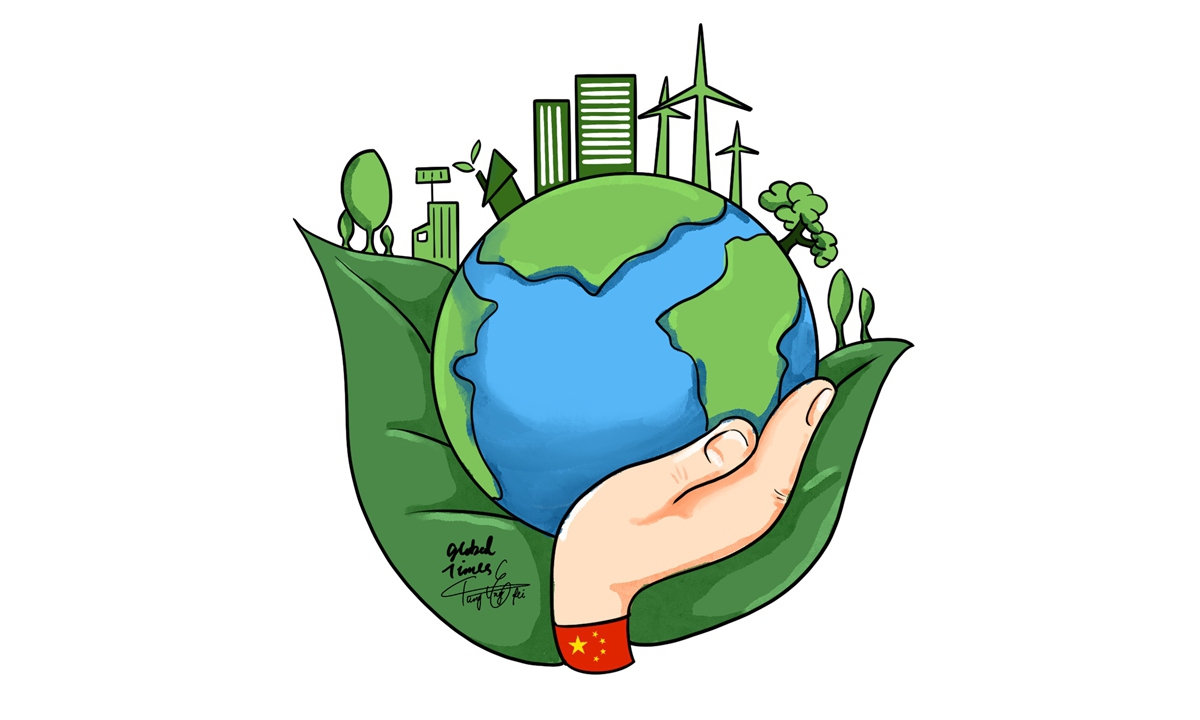
Illustration: Tang Tengfei/GT
There has been constant low-level sniping in the West against China's record on climate change, in particular its expansion of coal mining, and its target of 2060 rather than 2050 for carbon zero. I have viewed this with mild if irritated amusement, because when it comes to results, then China, we can be sure, will deliver and most Western countries will fall short, probably well short. It is now becoming clear, however, that we will not have to wait much longer to judge their relative performances. The answer is already near at hand.We now know that in 2023 China's share of renewable energy capacity reached about 50 percent of its total energy capacity. China is on track to shatter its target of installing 1200GW of solar and wind energy capacity by 2030, five years ahead of schedule. And international experts are forecasting that China's target of reaching peak CO2 emissions by 2030 will probably be achieved ahead of schedule, perhaps even by a matter of years.
Hitherto, China has advisedly spoken with a quiet voice about its climate targets, sensitive to the fact that it has become by far the world's largest CO2 emitter and aware that its own targets constituted a huge challenge. Now, however, it looks as if China's voice on global warming will carry an authority that no other nation will be able to compete with.
There is another angle to this. China is by far the biggest producer of green tech, notably EVs, and renewable energy, namely solar photovoltaics and wind energy. Increasingly China will be able to export these at steadily reducing prices to the rest of the world. The process has already begun. It leaves the West with what it already sees as a tricky problem. How can it become dependent on China for the supply of these crucial elements of a carbon-free economy when it is seeking to de-risk (EU) or decouple (US) its supply chains from China?
Climate change poses the greatest risk to humanity of all the issues we face today. There are growing fears that the 1.5-degree Celsius target for global warming will not be met. 2023 was the hottest year ever recorded. Few people are now unaware of the grave threat global warming poses to humanity. This requires the whole world to make common cause and accept this as our overarching priority.
Alas, the EU is already talking about introducing tariffs to make Chinese EVs more expensive. And it is making the same kind of noises about Chinese solar panels. The problem is this. Whether Europe likes it or not, it needs a plentiful supply of Chinese EVs and solar panels if it is to reduce its carbon emissions at the speed that the climate crisis requires. According to the International Energy Authority, China "deployed as much solar capacity last year as the entire world did in 2022 and is expected to add nearly four times more than the EU and five times more than the US from 2023-28." The IEA adds, "two-thirds of global wind manufacturing expansion planned for 2025 will occur in China, primarily for its domestic market." In other words, willy-nilly, the West desperately needs China's green tech products.
Knee-jerk protectionism demeans Europe; it is a petty and narrow-minded response to the greatest crisis humanity has ever faced. Instead of seeking to resist or obstruct Chinese green imports, it should cooperate with China and eagerly embrace its products. As a recent Financial Times editorial stated: "Beijing's green advances should be seen as positive for China, and for the world."
The climate crisis is now in the process of transforming the global political debate. Hitherto it seemed relatively disconnected. That period is coming to an end. China's dramatic breakthrough in new green technologies is offering hope not just to China, but to the whole world, because China will increasingly be able to supply both the developed and developing world with the green technology needed to meet their global targets. Or, to put it another way, it looks very much as if China's economic and technological prowess will play a crucial role in the global fight against climate change.
We should not be under any illusion about the kind of challenge humanity faces. We are now required to change the source of energy that powers our societies and economies. This is not new. It has happened before. But previously it was always a consequence of scientific and technological discoveries. Never before has humanity been required to make a conscious decision that, to ensure its own survival, it must adopt new sources of energy.
Such an unprecedented challenge will fundamentally transform our economies, societies, cultures, technologies, and the way we live our lives. It will also change the nature of geopolitics. The latter will operate according to a different paradigm, different choices, and different priorities. The process may have barely started, but it is beginning with a vengeance. Can the world rise to the challenge, or will it prioritize petty bickering over the vision needed to save humanity? On the front line, mundane as it might sound, are EVs, wind power, and solar photovoltaics.
The author is a visiting professor at the Institute of Modern International Relations at Tsinghua University and a senior fellow at the China Institute, Fudan University. Follow him on X @martjacques. opinion@globaltimes.com.cn




